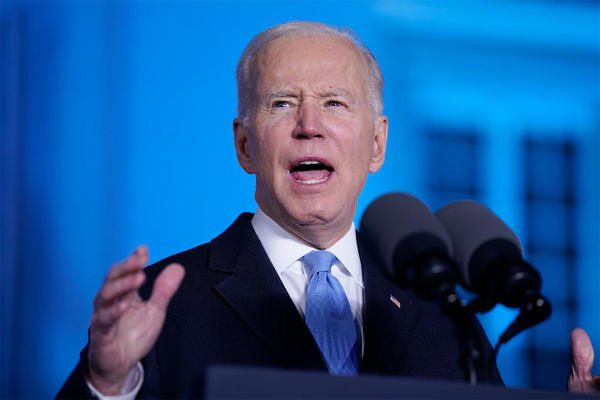
Let me stipulate that, on balance, President Biden probably should not have implied that the United States seeks to oust Russian President Vladimir Putin from office. Let me further stipulate that perhaps a White House sound engineer should cut Biden’s microphone whenever he strays from prepared remarks.
That said, the nine words about Putin that Biden ad-libbed into his speech in Warsaw on Saturday — “For God’s sake, this man cannot remain in power” — hardly constitute the massive “gaffe” his critics accuse him of committing.
Yes, Biden was overly passionate. Yes, he was insufficiently diplomatic. But was he wrong?
Putin is engaged in an unprovoked campaign of mass murder that borders on genocide. Fought to a standstill by Ukraine’s brave and skillful defense forces, Putin’s army, navy and air force have resorted to targeting defenseless civilians in apartment buildings, shopping centers, theaters and hospitals. The carnage is unspeakable, the devastation gratuitous. If and when the Russians finally enter Mariupol, the port on the Sea of Azov that remains under brutal siege, there literally will be no city left to occupy.
We are witnessing a war crime on a massive scale, and one man is wholly responsible: Putin. He alone decided to attack a sovereign nation and he alone can decide when this obscene slaughter ends.
Biden said what many people around the globe, including world leaders, are surely thinking. Putin has turned Ukraine into a charnel house and his own Russia into a pariah state. He has violated the principle of respect for internationally recognized borders that for more than seven decades has kept us from somehow stumbling into an unimaginable World War III.
U.S. policy is not to seek regime change in Moscow, as the White House and the State Department quickly emphasized in clarifying Biden’s remarks. But while it will never be possible for the United States and its European allies to ignore Russia, it is hard to imagine how Biden and future presidents will be able to constructively deal with Putin.
Do Biden’s words fundamentally change Putin’s view of U.S. and Western intentions? I doubt it; Putin has long accused internal critics of playing into the West’s hands by undermining his rule. Will the words change the way Putin is fighting this war? Again, I’m skeptical; Russia’s tactics have been altered not by any leader’s rhetoric (except Ukrainian President Volodymyr Zelensky’s) but by the prowess and resolution of Ukrainian soldiers and civilians.
The Kremlin will be happy to use the “cannot remain in power” line as propaganda, perhaps as purported support for Putin’s claim that Ukraine is not a “real” country but rather a tool of NATO “aggression” against Russia. But Putin’s much bigger concern, if he is thinking logically, should be the military weapons and other gear that NATO and other Western nations are providing — the Javelin missiles that have destroyed hundreds of Russian tanks, according to the Ukrainian government, or the Stinger missiles that have helped down dozens of Russian aircraft.
It can be no surprise to Putin that Biden doesn’t like him, or even that Biden wishes he were no longer leading Russia. If Putin wanted to cite “evidence” that the United States is trying to provoke regime change, he needed to look no further than the fact that so many of the toughest financial sanctions are aimed at him, his inner circle and the oligarchs who owe their great wealth to his patronage.
It is almost amusing to hear Biden’s critics at home accuse him of escalating the crisis. Sen. James E. Risch (R-Idaho), ranking member of the Senate Foreign Relations Committee, called the president’s words a “horrendous gaffe” that is “going to cause a huge problem.”
A few days earlier, however, Risch effectively accused Biden of being too soft on Putin. He was among a group of 42 Republican senators who urged Biden to facilitate the transfer of Soviet-era MiG fighter jets from Poland to the Ukrainian air force — a step the Biden administration believes would put NATO too close to being in combat with Russia.
In Biden’s words, I heard anger, frustration and resolve. But I did not hear — even before the cleanup — any change in U.S. policy toward Putin and Russia. It is not our place to decide who leads the Russian Federation. Nor is it within our power.
In Warsaw, with the “cannot remain” phrase, Biden was giving voice to the victims and refugees of Putin’s war-of-choice. “I was expressing moral outrage that I feel, and I make no apologies for it,” Biden said Monday. His controversial words were not by any standard “horrendous.” Perhaps to a fault, they were human.
___________________________________________
Eugene Robinson writes a twice-a-week column on politics and culture and hosts a weekly online chat with readers. In a three-decade career at The Washington Post, Robinson has been city hall reporter, city editor, foreign correspondent in Buenos Aires and London, foreign editor, and assistant managing editor in charge of the paper’s Style section. Energiesnet.com does not necessarily share these views.
Editor’s Note: This article was originally published by The Washington Post, on March 28, 2022. All comments posted and published on EnergiesNet.com, do not reflect either for or against the opinion expressed in the comment as an endorsement of EnergiesNet.com or Petroleumworld.
Use Notice: This site contains copyrighted material the use of which has not always been specifically authorized by the copyright owner. We are making such material available in our efforts to advance understanding of issues of environmental and humanitarian significance. We believe this constitutes a ‘fair use’ of any such copyrighted material as provided for in section 107 of the US Copyright Law. In accordance with Title 17 U.S.C. Section 107. For more information go to: http://www.law.cornell.edu/uscode/17/107.shtml.
EnergiesNet.com 03 30 2022







